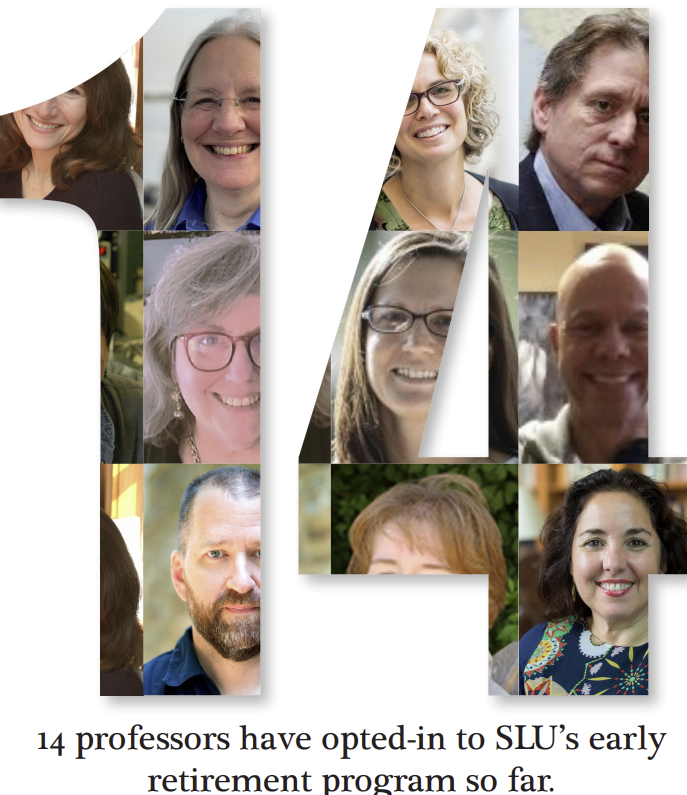St. Lawrence University administration announced an early retirement incentive program in March, resulting in the retirement of 16 professors from over 10 departments by August 31, 2024. As far as The Hill News’ investigation, 14 of them are retiring under the early retirement initiative.
Kim Asch, spokesperson of St. Lawrence University, pointed out the decreasing student enrollment numbers as the reason for the early retirement plan. “The result is a falling student-to-faculty ratio well below our historic long-term average of 12.5,” Asch says. Vice President of the University and Dean for Academic Affairs Alison Del Rossi set the incentive for early retirement to reduce the overall size of the full-time faculty, while strategically hiring in areas of high or growing student interest and university priorities.
The Faculty Retirement Incentive Program presents numerous benefits for professors, according to Asch. The program applies to full-time tenured faculty members who are at least 55 years old and served over 10 years as a faculty member at the university. Along with traditionally offered retirement benefits, the professors will get their base salary for one year starting from September 1, 2024. They will also have access to the university’s group medical insurance until age 65.
Lastly, they can use their office and stay in the Employee Assistance Program until June 30, 2025.
Paul Doty, university archives librarian, thinks the early retirement package was a good deal for professors. Doty participated in a financial town hall open for all faculty and staff on March 4, where President Kathryn Morris talked about the early retirement plan incentives. “Retired faculty outside this early retirement program have some of these early retirement benefits too, such as the athletic facility access, but not the office part,” he says.
Doty states that a similar policy is applied to balance the student-to-staff ratio. “If a staff member leaves, the university does not hire a person automatically,” he explains. Morris defends the rightsizing policy, the process of reducing the workforce at the university. “Because Kate prioritizes the rightsizing, they’re going to see if there is a way for the university not to fill this position,” Doty says.
The names of the retiring faculty under The Faculty Retirement Incentive Program were released by the President’s Office to the staff and faculty on April 25. An overwhelming number of following faculty members are retiring under early retirement plan: Amy Hauber, Catherine Jahncke, Dorothy Limouze, Elizabeth Regosin, Jeffrey Chiarenzelli, John Collins, Maegan Bos, Marina Llorente, Natalia Singer, Karl B. McKnight, Laura Rediehs, Loraina Ghiraldi, Pamela Thacher, Peter D. Ladd, Randy Hill and Roy Caldwell.
The University Administration will hire new professors for majors with high or growing student interest. Mathematics, Computer Science and Statistics Department is one of the departments with growing interest: The number of graduating students in math, computer science and statistics increased from 57 to 71 between 2021 and 2023. The department will have two newly hired professors for the next year, one for mathematics and one for data science.
Michael Schuckers, the chair of the Mathematics, Computer Science and Statistics Department, states that his department easily adjusts the class sizes and schedules due to faculty changes. For example, Maegan K. Bos, associate professor of mathematics, is retiring under the early retirement plan. Different professors in the department will step in and teach classes that Bos traditionally offered. “Being a large department makes it a little easier to do shuffling for classes,” Schuckers says.
On the other hand, Assistant Professor and Interim Chair of the Global Studies Department, Sandhya Ganapathy, expresses her efforts to keep her department dynamic despite the decreasing number of faculty since Professor and a former chair of Global Studies, John Collins, published his decision to retire under the early retirement plan. “We are definitely feeling the strain of Dr. Collins’ retirement and the lack of support from the administration for an additional faculty line,” Ganapathy says. She highlights the Department events such as the Global Studies SYE Poster Celebration, fix-it Night and a Pop-Up Art Gallery in the Global Dialogue Center. “But we continue to be a vibrant, dynamic department,” she says.



